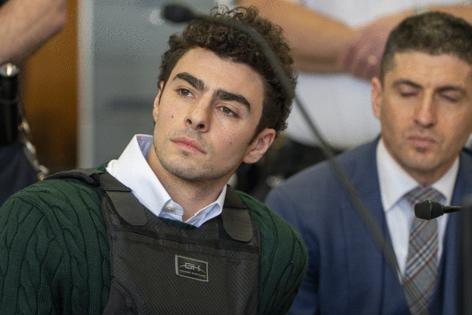Key murder and terrorism counts dismissed against Luigi Mangione, accused United Healthcare CEO killer
Published in News & Features
NEW YORK — A Manhattan judge on Tuesday dismissed terrorism offenses against Luigi Mangione, the suspected killer of United Healthcare CEO Brian Thompson, finding the Manhattan district attorney’s office presented “legally insufficient” evidence to a grand jury.
The ruling is a significant win for Mangione, who no longer faces a potential sentence of life without the possibility of parole for the state charges. He is still facing a second-degree murder count unrelated to terrorism allegations and lower-level offenses and the ruling has no bearing on his separate federal case in which the Justice Department is seeking the death penalty.
State Supreme Court Justice Gregory Carro announced the contents of his written ruling from the bench, moments after Mangione, 27, was brought into the courtroom.
Prosecutors had argued ahead of Tuesday’s hearing that terroristic intent was established because Mangione was not carrying out a “personal vendetta” when he allegedly gunned down Thompson, a father of two from Minnesota, but “violently broadcast a social and political message” that “inspired” threats to employees of UnitedHealthcare. New York legislators enacted the terrorism statute under which Mangione was charged six days after 9/11.
But Carro’s decision found the DA’s office had failed to establish Mangione intended to influence governmental policy by intimidation or coercion. He further agreed with the position of the Maryland man’s lawyers that prosecutors had conflated an ideological belief with the intent to intimidate or coerce a civilian population and wrote that he did not believe the legislature intended the employees of a company, no matter how big, to constitute a civilian population.
The judge said details highlighted by prosecutors about UnitedHealthcare employees feeling fearful after the high-profile murder and receiving threats did not establish that Mangione intended them to.
“The defendant’s apparent objective, as stated in his writings, was not to threaten, intimidate, or coerce, but rather, to draw attention to what he perceived as the greed of the insurance industry (‘members of the public can focus on greed’), and, as an additional possible consequence, to negatively affect the financials of the company,” Carro wrote.
“There was no evidence presented of a desire to terrorize the public, inspire widespread fear, engage in a broader campaign of violence, or to conspire with organized terrorist groups. Here, the crime — the heinous, but targeted and discrete killing of one person — is very different from the examples of terrorism set forth in the statute.”
Carro left the remainder of the indictment intact and denied Mangione’s motion to toss the case on double jeopardy grounds outright. The top count Mangione now faces in his state case carries an indeterminate sentence of 25 years to life. He’s due back before Carro on Dec. 1.
In a statement, a spokeswoman for District Attorney Alvin Bragg’s office said, “We respect the court’s decision and will proceed on the remaining nine counts, including murder in the second degree.”
Mangione’s lawyers, including Karen Friedman-Agnifilo and her husband, Marc, declined to comment outside court but stopped to receive applause from Mangione supporters, many holding signs with messages like “Free Luigi,”, who were pushed up against barriers like concertgoers across the street from the courthouse by Collect Pond Park.
Around two dozen people, most of them women, packed the back rows of Carro’s 13th-floor courtroom at 100 Centre St.. Some of them began lining up the day before to secure a seat.
Mangione has attracted more public support than any New York City defendant in modern memory, raising more than $1. 2 million toward his legal defense.
Flanked by armed officers, he walked into court just before 9:30 a.m. in beige prison garb, handcuffs, and shackles around his ankles. The high-profile defendant appeared in good spirits when officers escorted him out a short while later, raising his eyebrows and smiling.
The Ivy League computer science grad is accused of gunning down Thompson outside the Hilton Hotel in Midtown in the early morning hours of Dec. 4 as the health executive arrived for an annual healthcare conference and of planning the killing for months.
In his state and federal cases, prosecutors allege that Mangione’s motive was made clear by markings made on shell casings recovered at the scene, reading deny, delay, and defend, in an apparent reference to the healthcare industry routinely denying claims to boost its bottom line.
Prosecutors also cited his writings in the weeks and months before the killing, which authorities have described as a manifesto. One page outlined a plan to “wack the CEO at the annual parasitic bean-counter convention,” they allege.
Mangione allegedly fled the scene on a bicycle, seemingly vanishing into thin air as he entered Central Park. He was arrested more than 300 miles away at a McDonald’s in Altoona, PA, five days later, after a coast-to-coast manhunt.
Federally, the Manhattan U.S. attorney’s office has charged him with murder through the use of a firearm, stalking and related crimes. The top charge is death penalty eligible, an almost unheard of outcome in New York that his lawyers are arguing to get taken off the table.
Mangione is incarcerated at Brooklyn’s Metropolitan Detention Center.
_____
©2025 New York Daily News. Visit at nydailynews.com. Distributed by Tribune Content Agency, LLC.







Comments